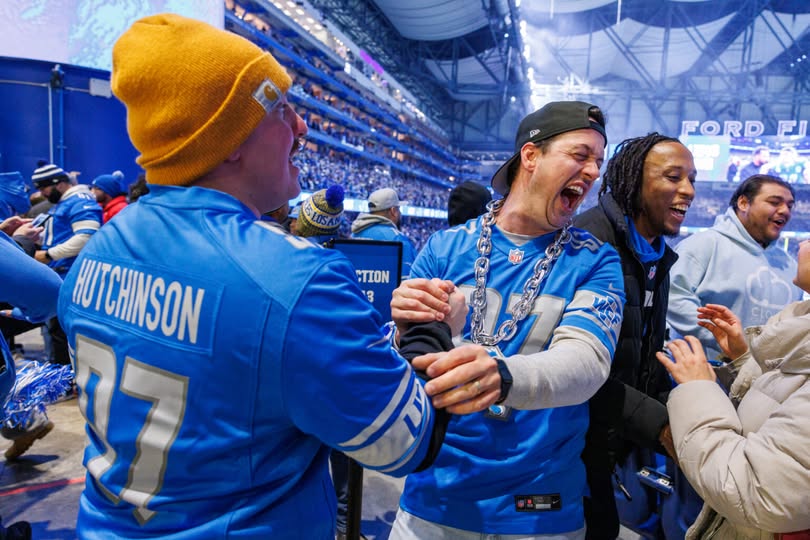From Lions to Lawmakers: How Die-Hard Sports Fandom Has Bled Into American Politics, Fueling Tribalism, Loyalty Wars, and a…
In America, few passions run as deep or as fiercely as sports fandom. Whether it’s the roar of a crowd in a packed stadium, the heated debates in a local bar, or the ritual of game day with friends and family, sports have long been a defining cultural force. Fans often identify with their teams as extensions of themselves, cultivating unwavering loyalty and, at times, fierce tribalism. Yet, in recent years, this once-clear boundary between sports and politics has become increasingly blurred. What began as a love for a team has morphed into an echo chamber for political identity, fueling tribalism, loyalty wars, and shaping public discourse in unexpected ways.
The phenomenon isn’t entirely new—sports and politics have intersected throughout American history, from Jackie Robinson breaking baseball’s color barrier to Muhammad Ali’s anti-war activism. But today’s landscape feels different. The intertwining of die-hard sports fandom with political allegiance reflects broader societal trends: polarization, identity politics, and the search for belonging in an era of rapid change and uncertainty. The same emotional investment that once fueled fandom now powers political loyalty, creating a volatile mix where allegiance to a team can mirror—and sometimes even dictate—political affiliation.
At the heart of this trend is tribalism, a primal human instinct. Sports teams serve as modern tribes, offering a sense of community and belonging. Fans often see their teams not just as groups of athletes but as symbolic representations of their values, backgrounds, and identity. This intense identification can foster solidarity but also hostility toward “outsiders” or rival fans. When this tribal loyalty migrates into the political arena, it intensifies polarization. Political opponents are no longer just people with differing views—they become enemies, rival “teams” to be defeated.
Social media has accelerated this fusion, providing platforms where sports and political identities converge and collide. Fans take to Twitter, Facebook, and TikTok not only to cheer on their teams but also to broadcast their political beliefs, often framing their sports allegiances as part of a broader cultural identity. Viral moments—like a player kneeling during the national anthem or an owner’s controversial statement—spark nationwide debates that transcend the game itself, turning stadiums into battlegrounds for political and cultural disputes. The lines between cheering for a touchdown and rallying for a political cause blur, and the stakes feel higher.
This dynamic has several consequences. First, it erodes the neutral space that sports once provided—a realm where Americans of all backgrounds could unite temporarily in shared passion. Instead of bridging divides, sports arenas and conversations have become extensions of political battlegrounds, further entrenching division. Families and friends who once bonded over games find themselves clashing over political loyalties tied to sports allegiances, complicating relationships and community cohesion.
Second, this fusion impacts athletes and sports organizations themselves. Players, coaches, and owners are increasingly pressured to take political stances or remain silent, with either choice carrying significant risks. When an athlete speaks out on a social or political issue, some fans respond with support, while others react with backlash, often weaponizing their loyalty or disloyalty as political currency. Teams and leagues must navigate these turbulent waters carefully, balancing commercial interests, fan expectations, and social responsibility. The rise of sports activism has become a double-edged sword, empowering voices but also igniting fierce backlash that threatens careers and reputations.
Third, the overlap between sports fandom and politics can be exploited by political actors. Politicians recognize the deep emotional connection fans have with their teams and sometimes use sports allegiances as shorthand to appeal to specific voter blocs. Campaign slogans, rallies, and advertisements increasingly co-opt sports imagery and rhetoric to tap into tribal loyalty. This can deepen political divisions by framing political contests as zero-sum games akin to a rivalry between sports teams, where compromise or empathy becomes secondary to winning.
At a deeper level, the sports-to-politics bleed reflects the way Americans are seeking identity anchors in a fragmented world. As traditional institutions—churches, unions, local communities—have weakened, people look for belonging and meaning in other places. Sports teams, with their rituals, symbols, and narratives, offer a powerful alternative. When political parties and movements tap into these tribal attachments, they gain access to a reservoir of emotional energy that can be mobilized for political ends.
The consequences for democracy and civic life are profound. Tribal loyalty tied to sports fandom can erode the deliberative spirit essential for democratic governance. When people view political opponents as existential threats—like rival fans—they are less likely to engage in dialogue, seek common ground, or accept compromise. Instead, politics becomes a zero-sum contest to be won at all costs. This fosters gridlock, cynicism, and polarization, weakening democratic institutions and social trust.
Moreover, the blending of sports and politics can exacerbate social inequalities. Sports fandom is not evenly distributed; it often reflects regional, racial, and class identities. When political identities become entangled with sports allegiances, it can reinforce existing divides rather than bridge them. For example, a fan base rooted in a predominantly white suburban community might feel a different political pull than one grounded in a diverse urban area, and these differences become magnified through the lens of sports.
Yet, despite these challenges, there is also potential for sports to serve as a platform for positive social change. The visibility and cultural significance of sports provide a unique opportunity to highlight issues of justice, equality, and community. Athletes and teams who use their platforms responsibly can help spark important conversations and promote empathy. The key lies in recognizing the dual nature of sports fandom—not only as a force for tribal loyalty and division but also as a means for connection and shared experience.
Addressing the growing fusion of sports fandom and political tribalism requires conscious effort. Fans, athletes, and leaders alike need to cultivate spaces where passion for the game can coexist with respect for diverse political views. Media and social platforms can play a role by promoting nuanced conversations rather than fueling outrage. Education about media literacy and the psychological underpinnings of tribalism can help individuals understand their own biases and foster empathy for others.
In the end, the journey from lions roaring in stadiums to lawmakers debating in halls of power is a reflection of the deep emotional currents that define human social life. Sports, at their best, unite and inspire. But when those same instincts turn into rigid political loyalty, they risk tearing the social fabric apart. Recognizing this complex interplay—and working to harness the positive potential while mitigating the divisive effects—will be one of the key challenges for American society in the years ahead.
The die-hard sports fan’s passion, so essential to the joy of the game, must not become a tool for political warfare. Instead, it can serve as a bridge—reminding us that beneath every rivalry and political difference lies a shared human desire for connection, belonging, and meaning. Balancing these competing forces will define the next chapter in the story of American sports and politics, one where lions and lawmakers alike might learn to play on the same field.



